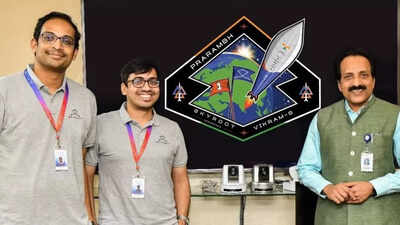- News
- India’s 1st privately built rocket set for suborbital launch with 3 payloads
India’s 1st privately built rocket set for suborbital launch with 3 payloads

Isro chairman S Somanath (right) unveiling the mission patch of Prarambh. Pawan Kumar Chandana (middle) and Naga Bharath Daka (left), co-founders of Skyroot Aerospace also seen. Picture credit: Skyroot
BENGALURU: India’s first privately developed rocket — Vikram-S — is undergoing final launch preparations at Isro’s launch pad in Sriharikota and is expected to be launched in a suborbital mission, later this week or next week.
The mission is named ‘Prarambh’ — meaning ‘the beginning’. The rocket is developed by startup Skyroot Aerospace, which has the technical launch clearance from Space regulator IN-SPACe and is looking at a launch window between November 12 and 16.
“A launch window between November 12 and 16 has been notified by authorities, the final date being confirmed based on weather conditions. With this maiden mission, Skyroot Aerospace is set to become the first private space company in India to launch a rocket into space, heralding a new era for the space sector which was recently opened up to facilitate private sector participation,” the Hyderabad-headquartered company said.
Skyroot, incidentally, was the first Indian startup to sign an MoU with Isro in this regard. “We could build and get Vikram-S mission-ready in such a short time only because of the invaluable support we received from Isro and IN-SPACe, and the technology talent that we inherently possess,” Pawan Kumar Chandana, CEO, Skyroot said.
Skyroot’s launch vehicles are named ‘Vikram’ as a tribute to the founder of the Indian Space programme Vikram Sarabhai. Naga Bharath Daka, COO, Skyroot said: “Vikram-S is a single-stage sub-orbital launch vehicle which would carry three customer payloads and help test and validate the majority of the technologies in the Vikram series of space launch vehicles. We are utilising infrastructure at Isro’s spaceport in Sriharikota for the launch.”
Other than a launch vehicle, Skyroot is also working on a cryogenic engine — Dhawan-I, named after former Isro chairman Prof Satish Dhawan — running on two high-performance rocket propellants, Liquid Natural Gas (LNG) & Liquid Oxygen (LoX).
In November 2021, the firm successfully tested a prototype of this engine, India’s first privately developed fully Cryogenic rocket engine for 20 seconds.
The mission is named ‘Prarambh’ — meaning ‘the beginning’. The rocket is developed by startup Skyroot Aerospace, which has the technical launch clearance from Space regulator IN-SPACe and is looking at a launch window between November 12 and 16.
“A launch window between November 12 and 16 has been notified by authorities, the final date being confirmed based on weather conditions. With this maiden mission, Skyroot Aerospace is set to become the first private space company in India to launch a rocket into space, heralding a new era for the space sector which was recently opened up to facilitate private sector participation,” the Hyderabad-headquartered company said.
Skyroot, incidentally, was the first Indian startup to sign an MoU with Isro in this regard. “We could build and get Vikram-S mission-ready in such a short time only because of the invaluable support we received from Isro and IN-SPACe, and the technology talent that we inherently possess,” Pawan Kumar Chandana, CEO, Skyroot said.
Skyroot’s launch vehicles are named ‘Vikram’ as a tribute to the founder of the Indian Space programme Vikram Sarabhai. Naga Bharath Daka, COO, Skyroot said: “Vikram-S is a single-stage sub-orbital launch vehicle which would carry three customer payloads and help test and validate the majority of the technologies in the Vikram series of space launch vehicles. We are utilising infrastructure at Isro’s spaceport in Sriharikota for the launch.”
Other than a launch vehicle, Skyroot is also working on a cryogenic engine — Dhawan-I, named after former Isro chairman Prof Satish Dhawan — running on two high-performance rocket propellants, Liquid Natural Gas (LNG) & Liquid Oxygen (LoX).
In November 2021, the firm successfully tested a prototype of this engine, India’s first privately developed fully Cryogenic rocket engine for 20 seconds.
FOLLOW US ON SOCIAL MEDIA
FacebookTwitterInstagramKOO APPYOUTUBE
Start a Conversation
end of article
